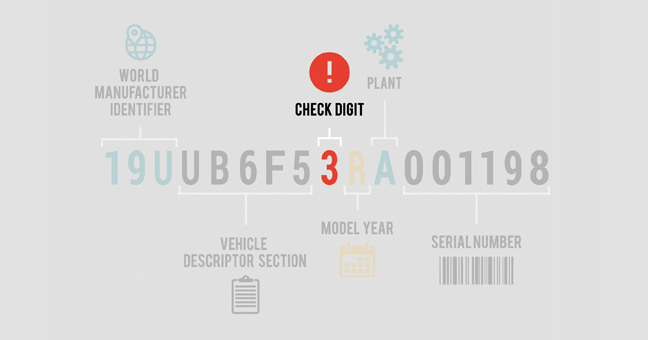

Mar 8 2024
By Jason Doring
No manufacturing process is perfect, an obvious fact that the automotive industry knows too well, with nearly 900 recalls affecting over 34 million cars alone in 2023. No part of a car, truck, or trailer is immune from an error, and that includes the Vehicle Identification Number (VIN).
An issue with VIN numbers that has occurred several times in recent years revolves around the 9th digit in the 17 digit VIN, also known as the “check” or “checksum” digit, which is intended to verify the validity of the VIN. Typically, this VIN number is generated using a defined calculation method, but occasionally OEMs mistakenly print VINs with an incorrect digit, causing this calculation to fail and the VIN to appear invalid. This type of error has impacted a variety of makes and models, including the following:
Improperly formatted VIN numbers often cannot be read by software platforms supporting the dealership, insurance, and service and maintenance industries. This can create a host of problems throughout the vehicles’ lifecycle for both the owner and the businesses serving the vehicle. An inability to recognize the VIN number could cause issues such as not being aware of recalls, missing regular servicing intervals, and encountering logistical difficulties reselling the car. At the government level, consumers might also encounter difficulties, titling and registering a vehicle, and applying for automotive insurance if the check digit is shown to be invalid.
Businesses experiencing these difficulties around a VIN number can unfortunately and unfairly receive blame from frustrated customers as they hit obstacles identifying the proper services needed around these vehicles.
Dealer solutions providers and other organizations dependent on VIN data for their key operational processes often base their VIN decoding from a delivered database, also known as a SFTP “flat file.” This type of VIN database does have several benefits, such as flexible querying and the ability to host the data internally, but a delivered VIN database cannot address unexpected errors in VIN check digits in real time.
An API-based VIN database, hosted by a data provider, can address VIN check digit errors as they happen, preventing disruption of any processes or services needed for these vehicles.
DataOne Software’s API web service has a defined workaround solution for vehicles known to be exposed to checksum digit errors. DataOne works directly with the OEM to receive a list of VINs impacted by the error and excludes them from check digit validation. Consequently, the VIN will be decoded properly and not be flagged with a check digit error, enabling automotive vendors to move forward with their sales, service, and maintenance processes unhindered.
If an API web service is not feasible for any reason, DataOne specifically can offer support for customers receiving data via a flat file and wish to build their own workaround for invalid VIN numbers. This partnership enables all DataOne customers to continue their optimal processes regardless of the extent of their available resources.
Occasionally, an error with the VIN occurs beyond just the checksum digit. There have been instances where vehicles have accidentally been given the same make and model designation (in VIN digits 4-8), creating significant confusion for VIN decoding. DataOne again leveraged its strong OEM partnerships to obtain the affected VINs and the corrected data, for immediate integration into its VIN API database. This prevented customers from being unable to make distinctions between these vehicles, which came from two different OEMs.
If you would like to learn more about how DataOne’s API service enables our customers to immediately adapt to errors in VIN number generation, you can click on the link below to speak to one of our data experts.